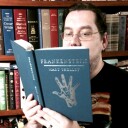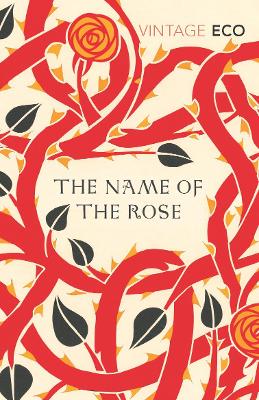
Read the enthralling medieval murder mystery.
The year is 1327. Franciscans in a wealthy Italian abbey are suspected of heresy, and Brother William of Baskerville arrives to investigate. When his delicate mission is suddenly overshadowed by seven bizarre deaths, Brother William turns detective.
William collects evidence, deciphers secret symbols and coded manuscripts, and digs into the eerie labyrinth of the abbey where extraordinary things are happening under the cover of night. A spectacular popular and critical success, The Name of the Rose is not only a narrative of a murder investigation but an astonishing chronicle of the Middle Ages.
'Whether you're into Sherlock Holmes, Montaillou, Borges, the nouvelle critique, the Rule of St. Benedict, metaphysics, library design, or The Thing from the Crypt, you'll love it' Sunday Times
- ISBN10 0099466031
- ISBN13 9780099466031
- Publish Date 5 February 2004 (first published 31 December 1980)
- Publish Status Active
- Publish Country GB
- Publisher Vintage Publishing
- Imprint Vintage Classics
- Format Paperback (B-Format (198x129 mm))
- Pages 592
- Language English
Reviews


gmcgregor
It's about faith. It's about sin. It's about various schismatic movements within the Catholic Church in the 1200s and 1300s (the time of the anti-popes). It's about laughter and poverty and their roles within the lives of the cloistered. It's about those cloistered, their relationships with each other and the outside world. It's about books and learning and whether wanting to learn more is always a good thing and whether knowledge should be controlled. It's about power and having it and wanting it.
The story follows Adso, a young novice monk, traveling with Brother William of Baskervilles, a Franciscan when Franciscans were a very new movement. They arrive at an abbey famous for its incredible library and are begged by the abbot to help inquire into the death of a monk just the night before. William, who is an obvious and intentional analogue to Sherlock Holmes, is intrigued and goes about investigating. Was it a suicide? A murder? And every day, another monk keeps turning up dead, making William and Adso's work a race against time.
I can already tell I'm going to need (and want) to read this one again. It's so dense, so full of allusions and historical references I just don't understand, that it's obvious that to read this only once means that you'll never be able to fully appreciate it. It reminds me of Dante's Divine Comedy, in that it's certainly readable and enjoyable on its own, but without a fuller understanding of the world at the time, you can't really understand everything that's going on. So I'll need to read up on the establishment of the Franciscan order and the other religious splinter groups that developed around the same period and tackle this one again. The writing is lively and the characters and drama compelling enough that I'm sure it'll be a rewarding experience. But for the first time through, despite having liked it, I feel like I've missed enough that it wasn't quite as satisfying as it could have been.

clq
The Name of the Rose is a 13th century murder mystery told in the voice of a monk writing about 7 days from his youth he would never forget. I don’t know that many 13th century monks, but from what I can tell, the tone and style of the book is incredibly well done. At first it is so well done that it becomes irritating, but after a few chapters it is hard to imagine the story being told in any other way. Even though the book has very few jokes, the tone leads to plenty of really funny moments as undignified moments are being told of in a “dignified” manner, as well as a handful of beautifully absurd “proper” descriptions of things that are anything but. The two main characters of the story, and at times the plot, seems to follow the tried and tested Sherlock Holmes formula, perhaps just a tad too shamelessly at times. Still, the plot is solid, engaging, and exciting.
Seeing as the story takes place in an abbey, and is told by a monk, discussions of a religious nature are to be expected. For the most part I found them rather fascinating. There are plenty of interesting thoughts on religion, morals, literature, knowledge, and different ways of handling, using, and interpreting all of these things. This will always be a balancing act. There should be enough philosophy to add to the story, but not as much as to bore the reader/detract from the flow. A few times The Name of the Rose falls of this tight-rope rather badly. There are places where, in my opinion, pages of discussion takes place that adds nothing to the story at all. I’m sure I’m probably missing something, but some places, especially where historical religious figures are discussed, the inclusion of the discussions seems a little forced. That said, on balance, I found the “philosophical stuff” to add much more than it detracted.
Overall I thought the book was good, but inconsistent. There are plenty of really fantastic moments. There are also plenty of moments that are… well, boring, but these are made up for by the good times. It’s not an easy read, it’s at times a frustrating read, but when all is said and done, I think it is a very worthwhile read.

Michael @ Knowledge Lost
Baskerville is an intellectual and almost Sherlock in the way he analyses and comes to his conclusions; with his trusty sidekick, Watson… I mean Adso who is narrating this book many years later as a memoir, giving Umberto Eco the perfect chance to flood the novel with all his knowledge of Medieval Catholicism.
This book is heavy in explaining the medieval times and the fights between the different Catholic factions, as well as the sheer ease of convicting someone as a heretic. I loved Eco’s other novel Foucault's Pendulum because of the subject matter (conspiracies) but I think this book is an easier book to read, and if you are interested in learning about Medieval times and the Catholics back then, it is a good way to teach and entertain.
